Dementia Care: Challenges and Solutions
VerifiedAdded on 2020/06/06
|8
|2294
|34
AI Summary
This assignment delves into the multifaceted aspects of dementia care. It examines the impact of dementia on individuals, families, and society, highlighting the unique challenges faced by caregivers. The assignment also explores various interventions and strategies aimed at improving the quality of life for people with dementia and their loved ones. Topics covered include support systems, care models, public health approaches, and the role of social networks in mitigating the burden of dementia.
Contribute Materials
Your contribution can guide someone’s learning journey. Share your
documents today.

Supporting Significant
Life Events
Life Events
Secure Best Marks with AI Grader
Need help grading? Try our AI Grader for instant feedback on your assignments.
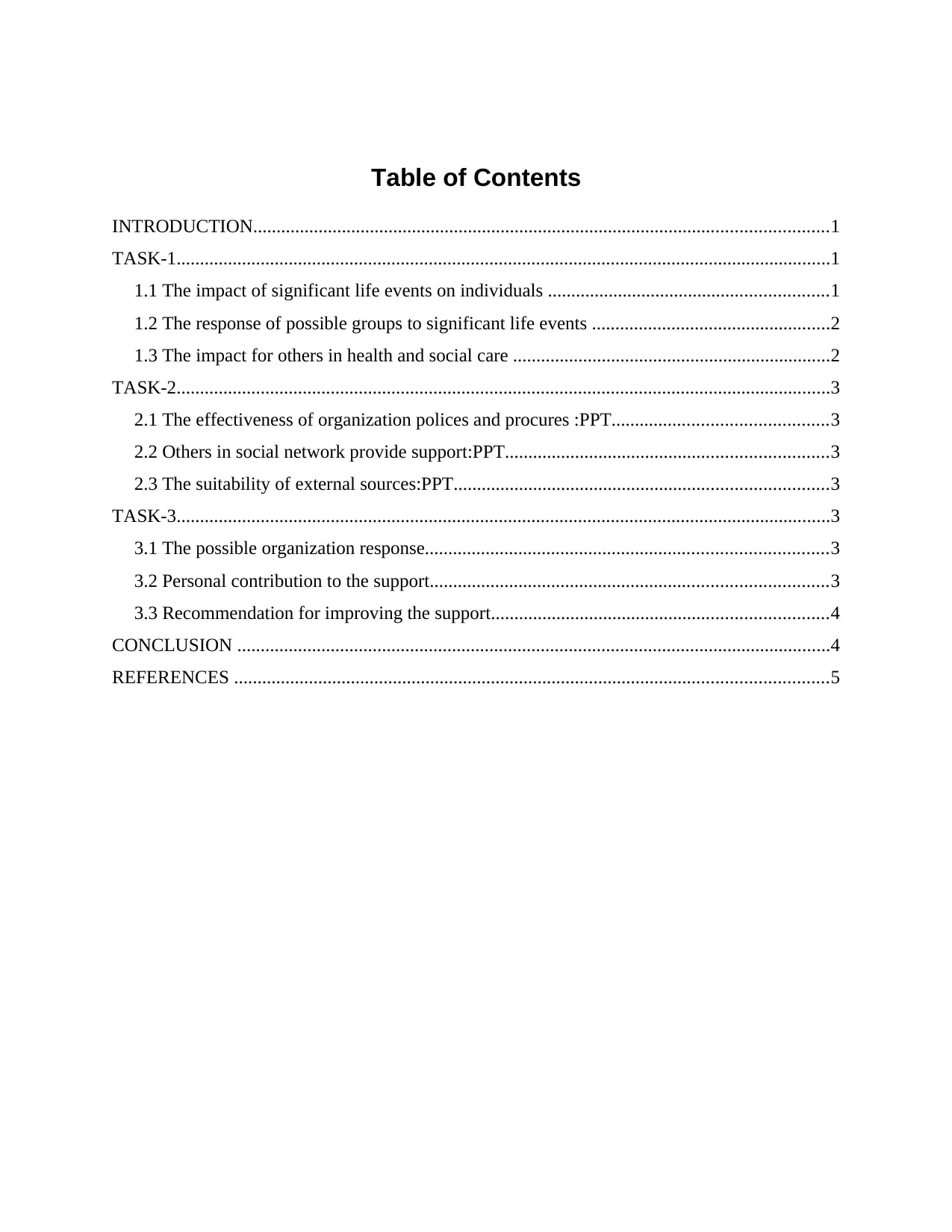
Table of Contents
INTRODUCTION...........................................................................................................................1
TASK-1............................................................................................................................................1
1.1 The impact of significant life events on individuals ............................................................1
1.2 The response of possible groups to significant life events ...................................................2
1.3 The impact for others in health and social care ....................................................................2
TASK-2............................................................................................................................................3
2.1 The effectiveness of organization polices and procures :PPT..............................................3
2.2 Others in social network provide support:PPT.....................................................................3
2.3 The suitability of external sources:PPT................................................................................3
TASK-3............................................................................................................................................3
3.1 The possible organization response......................................................................................3
3.2 Personal contribution to the support.....................................................................................3
3.3 Recommendation for improving the support........................................................................4
CONCLUSION ...............................................................................................................................4
REFERENCES ...............................................................................................................................5
INTRODUCTION...........................................................................................................................1
TASK-1............................................................................................................................................1
1.1 The impact of significant life events on individuals ............................................................1
1.2 The response of possible groups to significant life events ...................................................2
1.3 The impact for others in health and social care ....................................................................2
TASK-2............................................................................................................................................3
2.1 The effectiveness of organization polices and procures :PPT..............................................3
2.2 Others in social network provide support:PPT.....................................................................3
2.3 The suitability of external sources:PPT................................................................................3
TASK-3............................................................................................................................................3
3.1 The possible organization response......................................................................................3
3.2 Personal contribution to the support.....................................................................................3
3.3 Recommendation for improving the support........................................................................4
CONCLUSION ...............................................................................................................................4
REFERENCES ...............................................................................................................................5
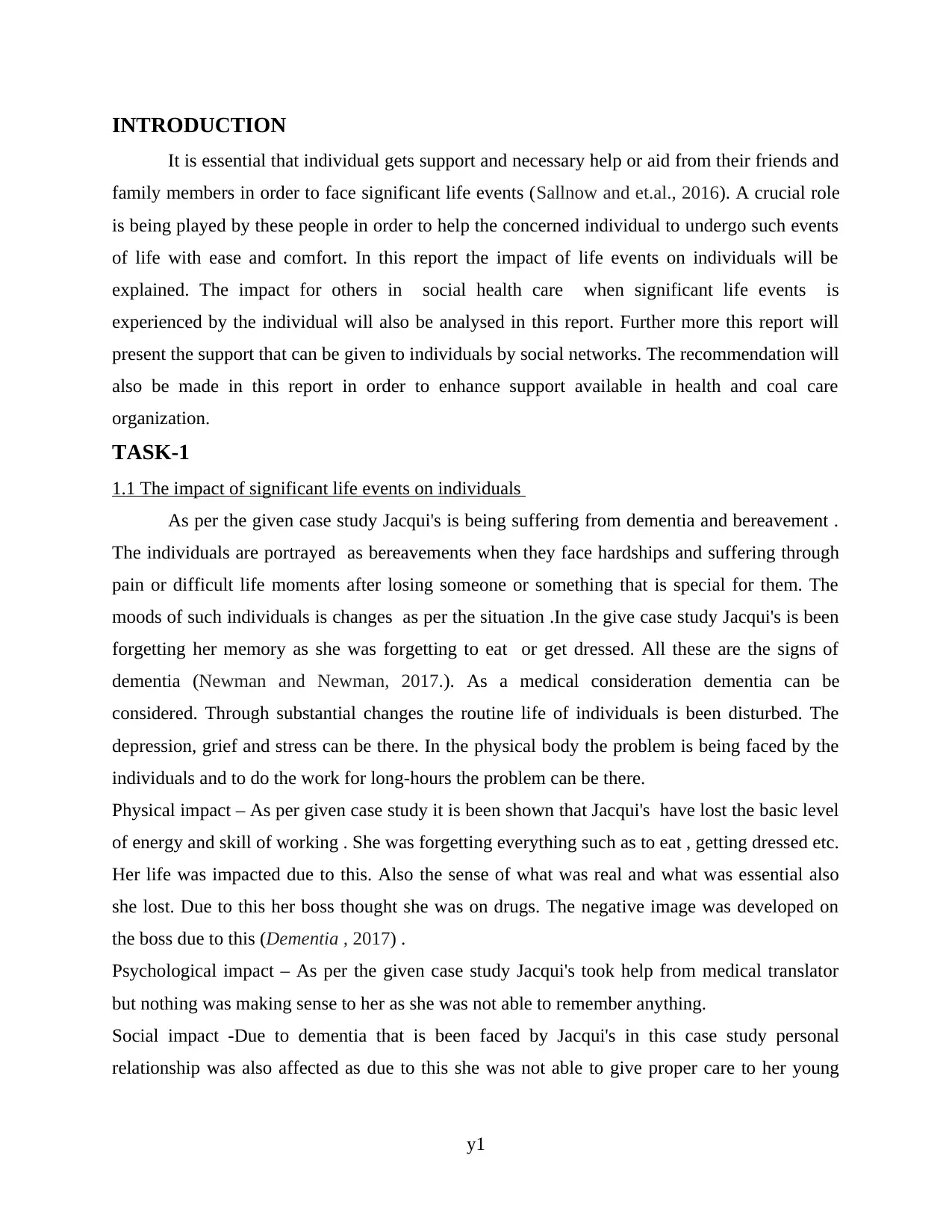
INTRODUCTION
It is essential that individual gets support and necessary help or aid from their friends and
family members in order to face significant life events (Sallnow and et.al., 2016). A crucial role
is being played by these people in order to help the concerned individual to undergo such events
of life with ease and comfort. In this report the impact of life events on individuals will be
explained. The impact for others in social health care when significant life events is
experienced by the individual will also be analysed in this report. Further more this report will
present the support that can be given to individuals by social networks. The recommendation will
also be made in this report in order to enhance support available in health and coal care
organization.
TASK-1
1.1 The impact of significant life events on individuals
As per the given case study Jacqui's is being suffering from dementia and bereavement .
The individuals are portrayed as bereavements when they face hardships and suffering through
pain or difficult life moments after losing someone or something that is special for them. The
moods of such individuals is changes as per the situation .In the give case study Jacqui's is been
forgetting her memory as she was forgetting to eat or get dressed. All these are the signs of
dementia (Newman and Newman, 2017.). As a medical consideration dementia can be
considered. Through substantial changes the routine life of individuals is been disturbed. The
depression, grief and stress can be there. In the physical body the problem is being faced by the
individuals and to do the work for long-hours the problem can be there.
Physical impact – As per given case study it is been shown that Jacqui's have lost the basic level
of energy and skill of working . She was forgetting everything such as to eat , getting dressed etc.
Her life was impacted due to this. Also the sense of what was real and what was essential also
she lost. Due to this her boss thought she was on drugs. The negative image was developed on
the boss due to this (Dementia , 2017) .
Psychological impact – As per the given case study Jacqui's took help from medical translator
but nothing was making sense to her as she was not able to remember anything.
Social impact -Due to dementia that is been faced by Jacqui's in this case study personal
relationship was also affected as due to this she was not able to give proper care to her young
y1
It is essential that individual gets support and necessary help or aid from their friends and
family members in order to face significant life events (Sallnow and et.al., 2016). A crucial role
is being played by these people in order to help the concerned individual to undergo such events
of life with ease and comfort. In this report the impact of life events on individuals will be
explained. The impact for others in social health care when significant life events is
experienced by the individual will also be analysed in this report. Further more this report will
present the support that can be given to individuals by social networks. The recommendation will
also be made in this report in order to enhance support available in health and coal care
organization.
TASK-1
1.1 The impact of significant life events on individuals
As per the given case study Jacqui's is being suffering from dementia and bereavement .
The individuals are portrayed as bereavements when they face hardships and suffering through
pain or difficult life moments after losing someone or something that is special for them. The
moods of such individuals is changes as per the situation .In the give case study Jacqui's is been
forgetting her memory as she was forgetting to eat or get dressed. All these are the signs of
dementia (Newman and Newman, 2017.). As a medical consideration dementia can be
considered. Through substantial changes the routine life of individuals is been disturbed. The
depression, grief and stress can be there. In the physical body the problem is being faced by the
individuals and to do the work for long-hours the problem can be there.
Physical impact – As per given case study it is been shown that Jacqui's have lost the basic level
of energy and skill of working . She was forgetting everything such as to eat , getting dressed etc.
Her life was impacted due to this. Also the sense of what was real and what was essential also
she lost. Due to this her boss thought she was on drugs. The negative image was developed on
the boss due to this (Dementia , 2017) .
Psychological impact – As per the given case study Jacqui's took help from medical translator
but nothing was making sense to her as she was not able to remember anything.
Social impact -Due to dementia that is been faced by Jacqui's in this case study personal
relationship was also affected as due to this she was not able to give proper care to her young
y1
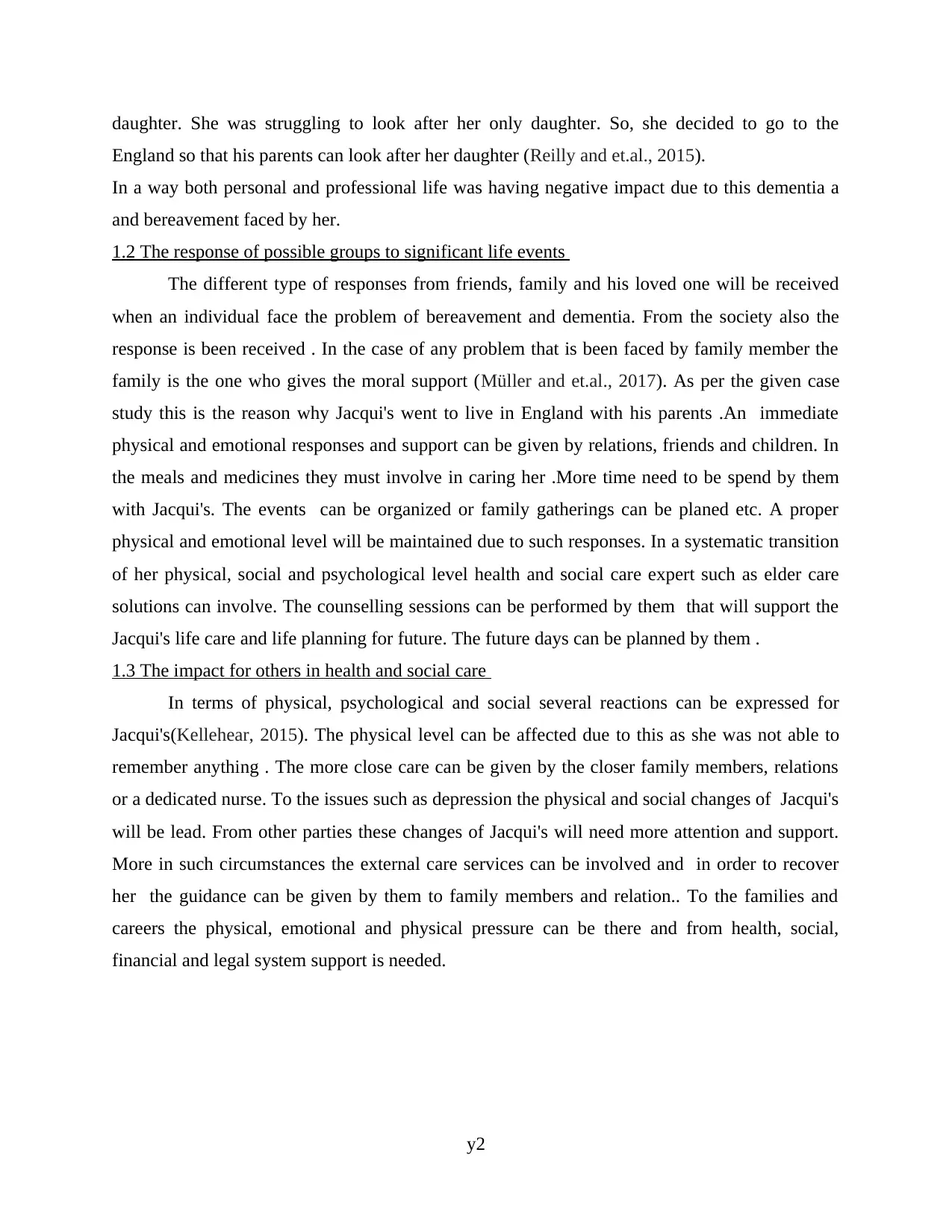
daughter. She was struggling to look after her only daughter. So, she decided to go to the
England so that his parents can look after her daughter (Reilly and et.al., 2015).
In a way both personal and professional life was having negative impact due to this dementia a
and bereavement faced by her.
1.2 The response of possible groups to significant life events
The different type of responses from friends, family and his loved one will be received
when an individual face the problem of bereavement and dementia. From the society also the
response is been received . In the case of any problem that is been faced by family member the
family is the one who gives the moral support (Müller and et.al., 2017). As per the given case
study this is the reason why Jacqui's went to live in England with his parents .An immediate
physical and emotional responses and support can be given by relations, friends and children. In
the meals and medicines they must involve in caring her .More time need to be spend by them
with Jacqui's. The events can be organized or family gatherings can be planed etc. A proper
physical and emotional level will be maintained due to such responses. In a systematic transition
of her physical, social and psychological level health and social care expert such as elder care
solutions can involve. The counselling sessions can be performed by them that will support the
Jacqui's life care and life planning for future. The future days can be planned by them .
1.3 The impact for others in health and social care
In terms of physical, psychological and social several reactions can be expressed for
Jacqui's(Kellehear, 2015). The physical level can be affected due to this as she was not able to
remember anything . The more close care can be given by the closer family members, relations
or a dedicated nurse. To the issues such as depression the physical and social changes of Jacqui's
will be lead. From other parties these changes of Jacqui's will need more attention and support.
More in such circumstances the external care services can be involved and in order to recover
her the guidance can be given by them to family members and relation.. To the families and
careers the physical, emotional and physical pressure can be there and from health, social,
financial and legal system support is needed.
y2
England so that his parents can look after her daughter (Reilly and et.al., 2015).
In a way both personal and professional life was having negative impact due to this dementia a
and bereavement faced by her.
1.2 The response of possible groups to significant life events
The different type of responses from friends, family and his loved one will be received
when an individual face the problem of bereavement and dementia. From the society also the
response is been received . In the case of any problem that is been faced by family member the
family is the one who gives the moral support (Müller and et.al., 2017). As per the given case
study this is the reason why Jacqui's went to live in England with his parents .An immediate
physical and emotional responses and support can be given by relations, friends and children. In
the meals and medicines they must involve in caring her .More time need to be spend by them
with Jacqui's. The events can be organized or family gatherings can be planed etc. A proper
physical and emotional level will be maintained due to such responses. In a systematic transition
of her physical, social and psychological level health and social care expert such as elder care
solutions can involve. The counselling sessions can be performed by them that will support the
Jacqui's life care and life planning for future. The future days can be planned by them .
1.3 The impact for others in health and social care
In terms of physical, psychological and social several reactions can be expressed for
Jacqui's(Kellehear, 2015). The physical level can be affected due to this as she was not able to
remember anything . The more close care can be given by the closer family members, relations
or a dedicated nurse. To the issues such as depression the physical and social changes of Jacqui's
will be lead. From other parties these changes of Jacqui's will need more attention and support.
More in such circumstances the external care services can be involved and in order to recover
her the guidance can be given by them to family members and relation.. To the families and
careers the physical, emotional and physical pressure can be there and from health, social,
financial and legal system support is needed.
y2
Secure Best Marks with AI Grader
Need help grading? Try our AI Grader for instant feedback on your assignments.
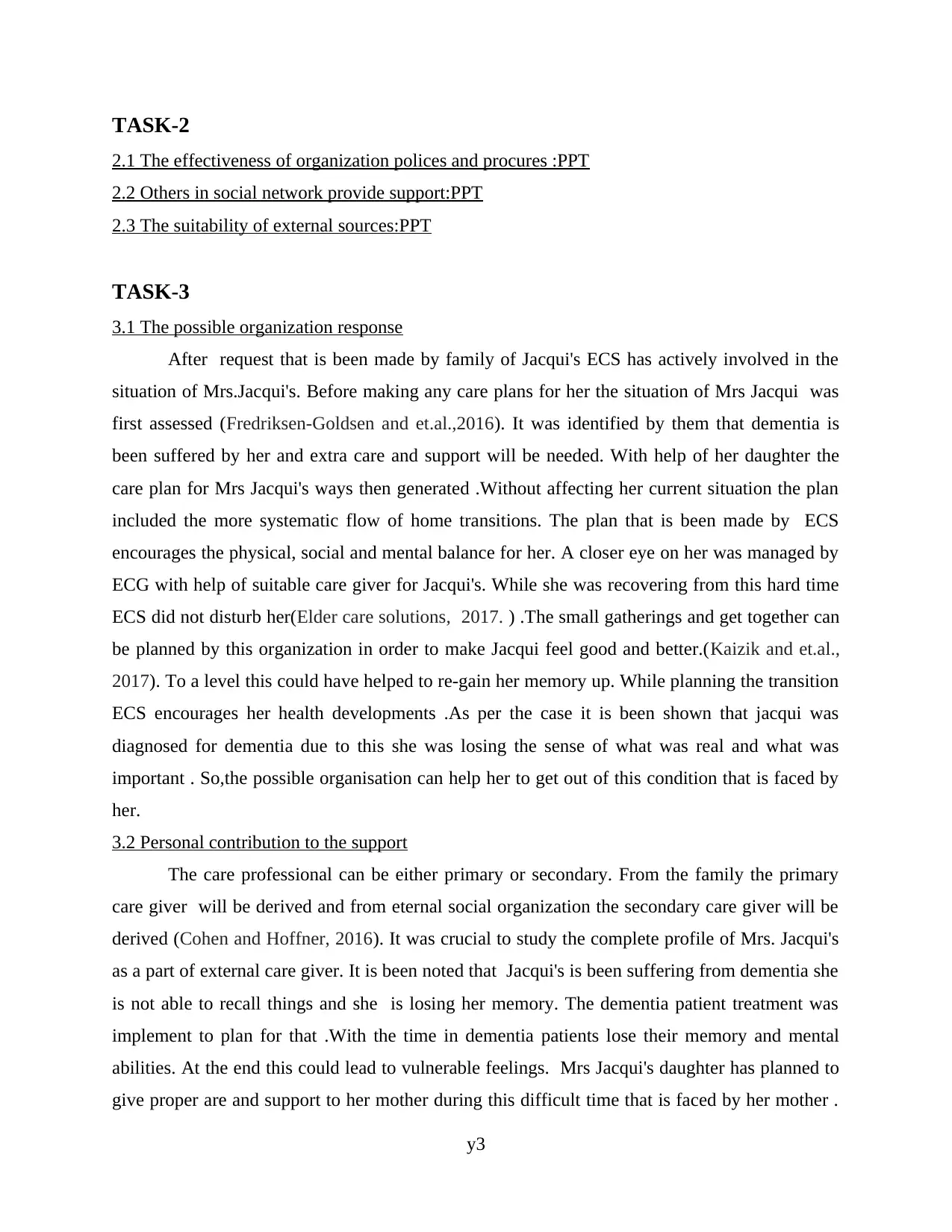
TASK-2
2.1 The effectiveness of organization polices and procures :PPT
2.2 Others in social network provide support:PPT
2.3 The suitability of external sources:PPT
TASK-3
3.1 The possible organization response
After request that is been made by family of Jacqui's ECS has actively involved in the
situation of Mrs.Jacqui's. Before making any care plans for her the situation of Mrs Jacqui was
first assessed (Fredriksen-Goldsen and et.al.,2016). It was identified by them that dementia is
been suffered by her and extra care and support will be needed. With help of her daughter the
care plan for Mrs Jacqui's ways then generated .Without affecting her current situation the plan
included the more systematic flow of home transitions. The plan that is been made by ECS
encourages the physical, social and mental balance for her. A closer eye on her was managed by
ECG with help of suitable care giver for Jacqui's. While she was recovering from this hard time
ECS did not disturb her(Elder care solutions, 2017. ) .The small gatherings and get together can
be planned by this organization in order to make Jacqui feel good and better.(Kaizik and et.al.,
2017). To a level this could have helped to re-gain her memory up. While planning the transition
ECS encourages her health developments .As per the case it is been shown that jacqui was
diagnosed for dementia due to this she was losing the sense of what was real and what was
important . So,the possible organisation can help her to get out of this condition that is faced by
her.
3.2 Personal contribution to the support
The care professional can be either primary or secondary. From the family the primary
care giver will be derived and from eternal social organization the secondary care giver will be
derived (Cohen and Hoffner, 2016). It was crucial to study the complete profile of Mrs. Jacqui's
as a part of external care giver. It is been noted that Jacqui's is been suffering from dementia she
is not able to recall things and she is losing her memory. The dementia patient treatment was
implement to plan for that .With the time in dementia patients lose their memory and mental
abilities. At the end this could lead to vulnerable feelings. Mrs Jacqui's daughter has planned to
give proper are and support to her mother during this difficult time that is faced by her mother .
y3
2.1 The effectiveness of organization polices and procures :PPT
2.2 Others in social network provide support:PPT
2.3 The suitability of external sources:PPT
TASK-3
3.1 The possible organization response
After request that is been made by family of Jacqui's ECS has actively involved in the
situation of Mrs.Jacqui's. Before making any care plans for her the situation of Mrs Jacqui was
first assessed (Fredriksen-Goldsen and et.al.,2016). It was identified by them that dementia is
been suffered by her and extra care and support will be needed. With help of her daughter the
care plan for Mrs Jacqui's ways then generated .Without affecting her current situation the plan
included the more systematic flow of home transitions. The plan that is been made by ECS
encourages the physical, social and mental balance for her. A closer eye on her was managed by
ECG with help of suitable care giver for Jacqui's. While she was recovering from this hard time
ECS did not disturb her(Elder care solutions, 2017. ) .The small gatherings and get together can
be planned by this organization in order to make Jacqui feel good and better.(Kaizik and et.al.,
2017). To a level this could have helped to re-gain her memory up. While planning the transition
ECS encourages her health developments .As per the case it is been shown that jacqui was
diagnosed for dementia due to this she was losing the sense of what was real and what was
important . So,the possible organisation can help her to get out of this condition that is faced by
her.
3.2 Personal contribution to the support
The care professional can be either primary or secondary. From the family the primary
care giver will be derived and from eternal social organization the secondary care giver will be
derived (Cohen and Hoffner, 2016). It was crucial to study the complete profile of Mrs. Jacqui's
as a part of external care giver. It is been noted that Jacqui's is been suffering from dementia she
is not able to recall things and she is losing her memory. The dementia patient treatment was
implement to plan for that .With the time in dementia patients lose their memory and mental
abilities. At the end this could lead to vulnerable feelings. Mrs Jacqui's daughter has planned to
give proper are and support to her mother during this difficult time that is faced by her mother .
y3
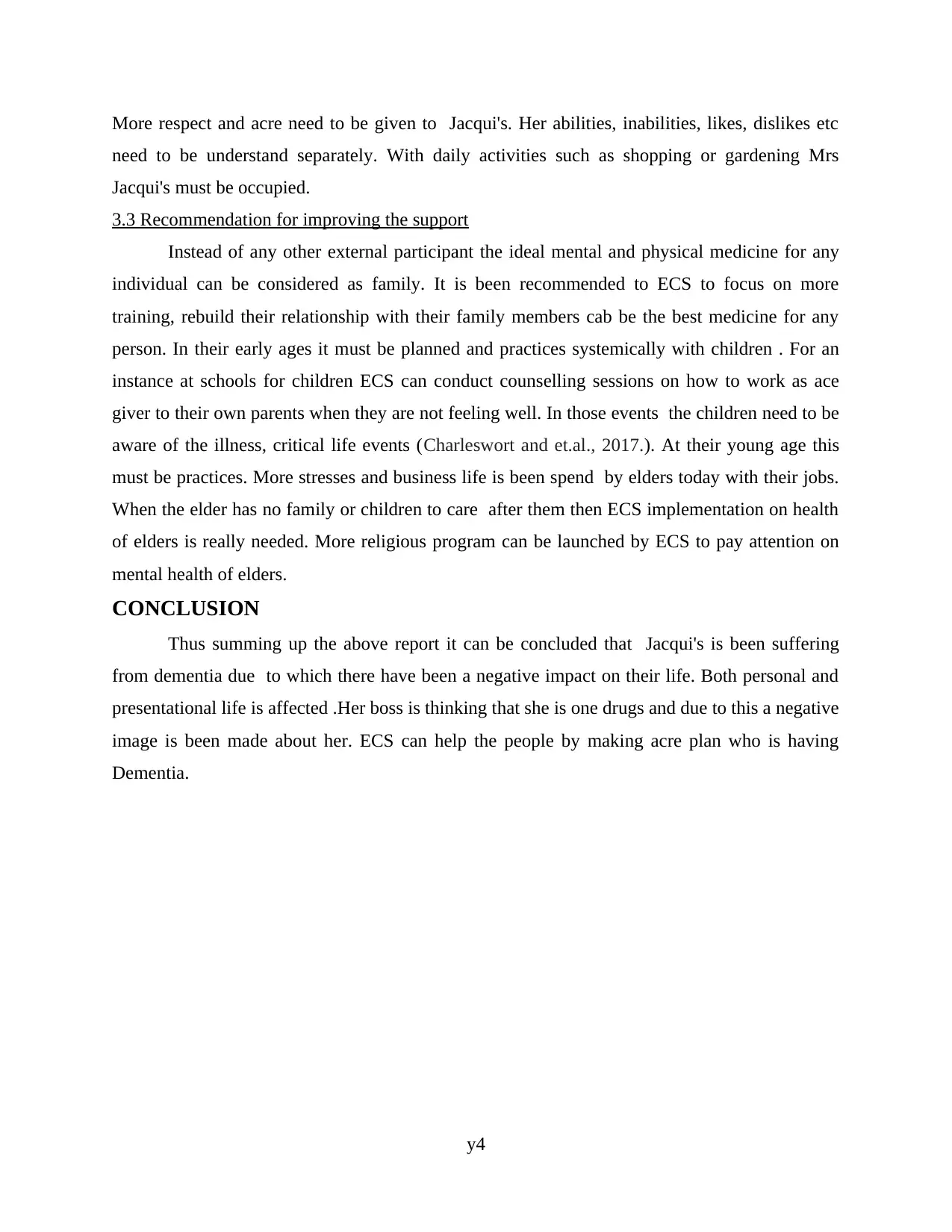
More respect and acre need to be given to Jacqui's. Her abilities, inabilities, likes, dislikes etc
need to be understand separately. With daily activities such as shopping or gardening Mrs
Jacqui's must be occupied.
3.3 Recommendation for improving the support
Instead of any other external participant the ideal mental and physical medicine for any
individual can be considered as family. It is been recommended to ECS to focus on more
training, rebuild their relationship with their family members cab be the best medicine for any
person. In their early ages it must be planned and practices systemically with children . For an
instance at schools for children ECS can conduct counselling sessions on how to work as ace
giver to their own parents when they are not feeling well. In those events the children need to be
aware of the illness, critical life events (Charleswort and et.al., 2017.). At their young age this
must be practices. More stresses and business life is been spend by elders today with their jobs.
When the elder has no family or children to care after them then ECS implementation on health
of elders is really needed. More religious program can be launched by ECS to pay attention on
mental health of elders.
CONCLUSION
Thus summing up the above report it can be concluded that Jacqui's is been suffering
from dementia due to which there have been a negative impact on their life. Both personal and
presentational life is affected .Her boss is thinking that she is one drugs and due to this a negative
image is been made about her. ECS can help the people by making acre plan who is having
Dementia.
y4
need to be understand separately. With daily activities such as shopping or gardening Mrs
Jacqui's must be occupied.
3.3 Recommendation for improving the support
Instead of any other external participant the ideal mental and physical medicine for any
individual can be considered as family. It is been recommended to ECS to focus on more
training, rebuild their relationship with their family members cab be the best medicine for any
person. In their early ages it must be planned and practices systemically with children . For an
instance at schools for children ECS can conduct counselling sessions on how to work as ace
giver to their own parents when they are not feeling well. In those events the children need to be
aware of the illness, critical life events (Charleswort and et.al., 2017.). At their young age this
must be practices. More stresses and business life is been spend by elders today with their jobs.
When the elder has no family or children to care after them then ECS implementation on health
of elders is really needed. More religious program can be launched by ECS to pay attention on
mental health of elders.
CONCLUSION
Thus summing up the above report it can be concluded that Jacqui's is been suffering
from dementia due to which there have been a negative impact on their life. Both personal and
presentational life is affected .Her boss is thinking that she is one drugs and due to this a negative
image is been made about her. ECS can help the people by making acre plan who is having
Dementia.
y4
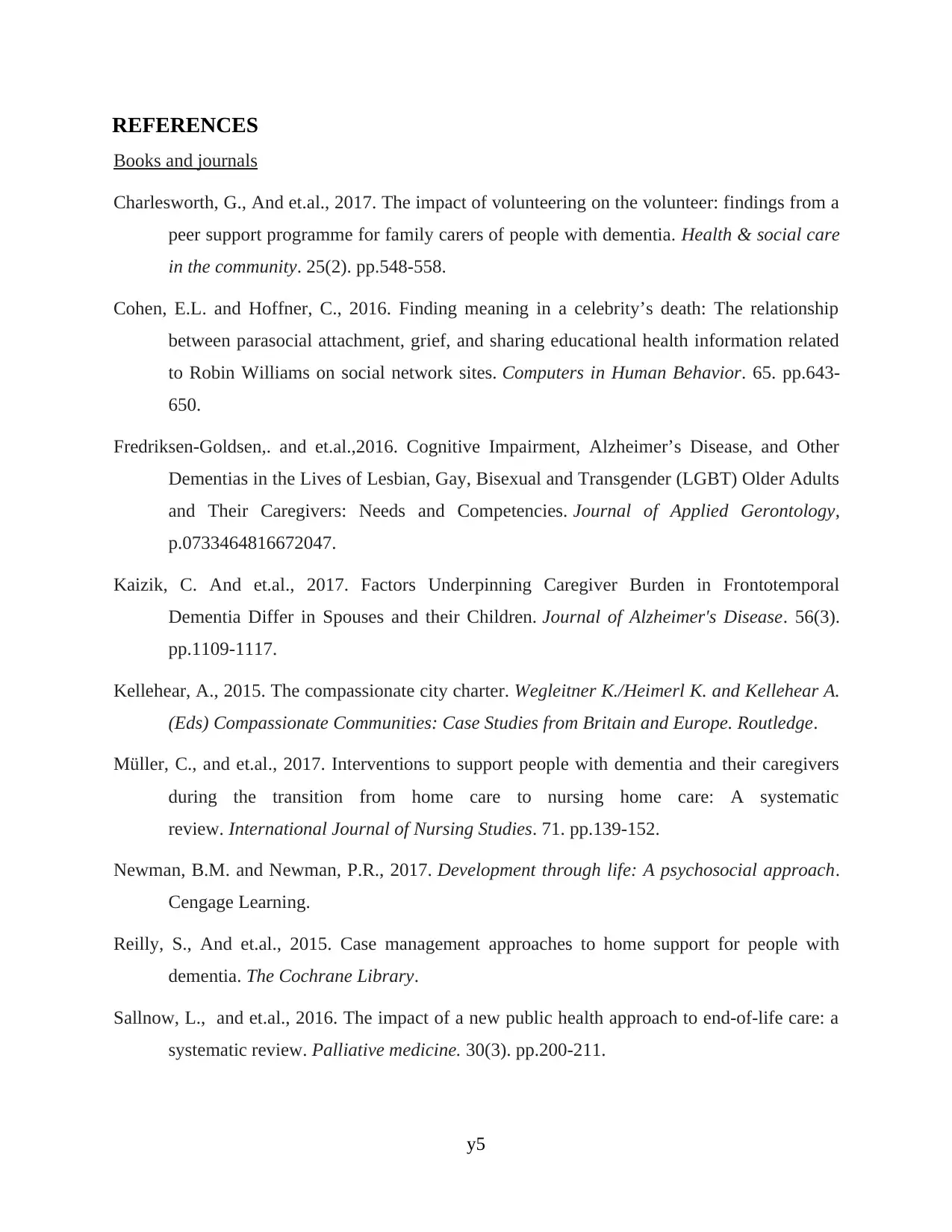
REFERENCES
Books and journals
Charlesworth, G., And et.al., 2017. The impact of volunteering on the volunteer: findings from a
peer support programme for family carers of people with dementia. Health & social care
in the community. 25(2). pp.548-558.
Cohen, E.L. and Hoffner, C., 2016. Finding meaning in a celebrity’s death: The relationship
between parasocial attachment, grief, and sharing educational health information related
to Robin Williams on social network sites. Computers in Human Behavior. 65. pp.643-
650.
Fredriksen-Goldsen,. and et.al.,2016. Cognitive Impairment, Alzheimer’s Disease, and Other
Dementias in the Lives of Lesbian, Gay, Bisexual and Transgender (LGBT) Older Adults
and Their Caregivers: Needs and Competencies. Journal of Applied Gerontology,
p.0733464816672047.
Kaizik, C. And et.al., 2017. Factors Underpinning Caregiver Burden in Frontotemporal
Dementia Differ in Spouses and their Children. Journal of Alzheimer's Disease. 56(3).
pp.1109-1117.
Kellehear, A., 2015. The compassionate city charter. Wegleitner K./Heimerl K. and Kellehear A.
(Eds) Compassionate Communities: Case Studies from Britain and Europe. Routledge.
Müller, C., and et.al., 2017. Interventions to support people with dementia and their caregivers
during the transition from home care to nursing home care: A systematic
review. International Journal of Nursing Studies. 71. pp.139-152.
Newman, B.M. and Newman, P.R., 2017. Development through life: A psychosocial approach.
Cengage Learning.
Reilly, S., And et.al., 2015. Case management approaches to home support for people with
dementia. The Cochrane Library.
Sallnow, L., and et.al., 2016. The impact of a new public health approach to end-of-life care: a
systematic review. Palliative medicine. 30(3). pp.200-211.
y5
Books and journals
Charlesworth, G., And et.al., 2017. The impact of volunteering on the volunteer: findings from a
peer support programme for family carers of people with dementia. Health & social care
in the community. 25(2). pp.548-558.
Cohen, E.L. and Hoffner, C., 2016. Finding meaning in a celebrity’s death: The relationship
between parasocial attachment, grief, and sharing educational health information related
to Robin Williams on social network sites. Computers in Human Behavior. 65. pp.643-
650.
Fredriksen-Goldsen,. and et.al.,2016. Cognitive Impairment, Alzheimer’s Disease, and Other
Dementias in the Lives of Lesbian, Gay, Bisexual and Transgender (LGBT) Older Adults
and Their Caregivers: Needs and Competencies. Journal of Applied Gerontology,
p.0733464816672047.
Kaizik, C. And et.al., 2017. Factors Underpinning Caregiver Burden in Frontotemporal
Dementia Differ in Spouses and their Children. Journal of Alzheimer's Disease. 56(3).
pp.1109-1117.
Kellehear, A., 2015. The compassionate city charter. Wegleitner K./Heimerl K. and Kellehear A.
(Eds) Compassionate Communities: Case Studies from Britain and Europe. Routledge.
Müller, C., and et.al., 2017. Interventions to support people with dementia and their caregivers
during the transition from home care to nursing home care: A systematic
review. International Journal of Nursing Studies. 71. pp.139-152.
Newman, B.M. and Newman, P.R., 2017. Development through life: A psychosocial approach.
Cengage Learning.
Reilly, S., And et.al., 2015. Case management approaches to home support for people with
dementia. The Cochrane Library.
Sallnow, L., and et.al., 2016. The impact of a new public health approach to end-of-life care: a
systematic review. Palliative medicine. 30(3). pp.200-211.
y5
Paraphrase This Document
Need a fresh take? Get an instant paraphrase of this document with our AI Paraphraser
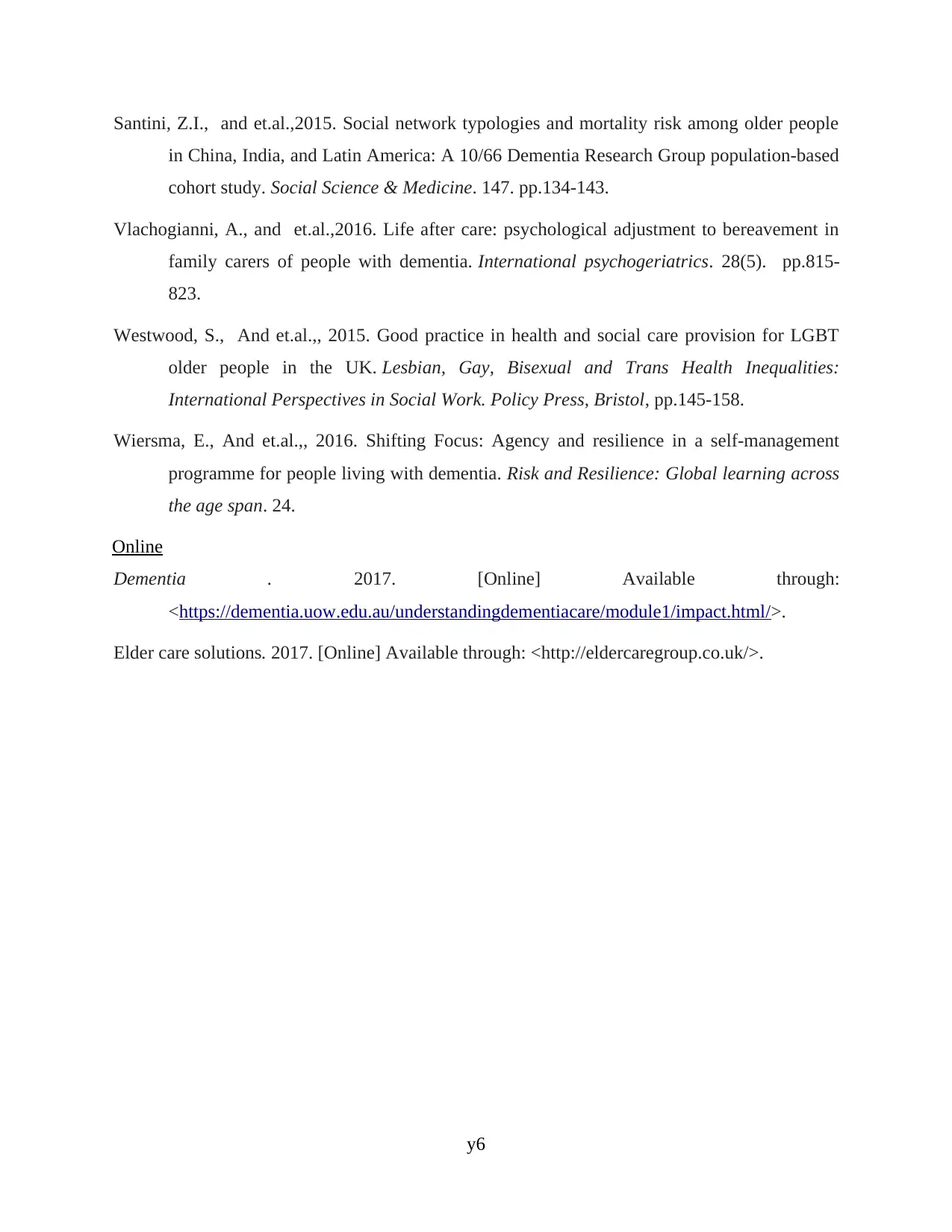
Santini, Z.I., and et.al.,2015. Social network typologies and mortality risk among older people
in China, India, and Latin America: A 10/66 Dementia Research Group population-based
cohort study. Social Science & Medicine. 147. pp.134-143.
Vlachogianni, A., and et.al.,2016. Life after care: psychological adjustment to bereavement in
family carers of people with dementia. International psychogeriatrics. 28(5). pp.815-
823.
Westwood, S., And et.al.,, 2015. Good practice in health and social care provision for LGBT
older people in the UK. Lesbian, Gay, Bisexual and Trans Health Inequalities:
International Perspectives in Social Work. Policy Press, Bristol, pp.145-158.
Wiersma, E., And et.al.,, 2016. Shifting Focus: Agency and resilience in a self-management
programme for people living with dementia. Risk and Resilience: Global learning across
the age span. 24.
Online
Dementia . 2017. [Online] Available through:
<https://dementia.uow.edu.au/understandingdementiacare/module1/impact.html/>.
Elder care solutions. 2017. [Online] Available through: <http://eldercaregroup.co.uk/>.
y6
in China, India, and Latin America: A 10/66 Dementia Research Group population-based
cohort study. Social Science & Medicine. 147. pp.134-143.
Vlachogianni, A., and et.al.,2016. Life after care: psychological adjustment to bereavement in
family carers of people with dementia. International psychogeriatrics. 28(5). pp.815-
823.
Westwood, S., And et.al.,, 2015. Good practice in health and social care provision for LGBT
older people in the UK. Lesbian, Gay, Bisexual and Trans Health Inequalities:
International Perspectives in Social Work. Policy Press, Bristol, pp.145-158.
Wiersma, E., And et.al.,, 2016. Shifting Focus: Agency and resilience in a self-management
programme for people living with dementia. Risk and Resilience: Global learning across
the age span. 24.
Online
Dementia . 2017. [Online] Available through:
<https://dementia.uow.edu.au/understandingdementiacare/module1/impact.html/>.
Elder care solutions. 2017. [Online] Available through: <http://eldercaregroup.co.uk/>.
y6
1 out of 8
Related Documents
Your All-in-One AI-Powered Toolkit for Academic Success.
+13062052269
info@desklib.com
Available 24*7 on WhatsApp / Email
![[object Object]](/_next/static/media/star-bottom.7253800d.svg)
Unlock your academic potential
© 2024 | Zucol Services PVT LTD | All rights reserved.





